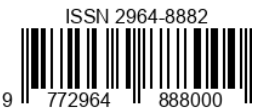Efektivitas Pembelajaran Dengan Model Seven Jumps Berbantuan Wag Di Masa Pandemi Covid-19
DOI:
https://doi.org/10.55606/lumen.v2i1.145Keywords:
Seven Jumps, WhatsApp Groups, independence, Covid-19Abstract
Seeing the root of the problem of student independence during the Covid-19 pandemic, implementing the effectiveness of learning with the Seven Jumps model assisted by the whatsapp group during the Covid-19 Pandemic is the aim of this research. This type of research approach is a qualitative and quantitative experiment carried out online with the Seven Jumps learning model assisted by WhatsApp groups. Data was collected by questionnaires, observation sheets and tests. Valid device tests come from expert perceptions, test the effectiveness of learning with statistical tests of the effect of regression and comparative t tests.
The results showed that the root problems and constraints for student independence in utilizing information technology to achieve the expected competencies were: low self-motivation to learn, self-assessment ability, self-discipline, self-control, responsibility, pattern-learning ability, self-reliance in designing appropriate learning objectives, design implementation strategies, monitoring the progress of learning outcomes, coordination of learning methods, and the need for guidance in finding learning resources, implementing independent learning with the Seven Jumps model assisted by the whatsapp group is effective. This is indicated by: a) there is a positive influence of independent learning on problem solving ability of 60.8%, b) The gain test to measure the effectiveness of the pretest and posttest is 0.52 in the medium category and the effectiveness is sufficient. The Seven Jumps method can be implemented boldly during the Covid-19 Pandemic.
References
Ardiansyah, I. (2013). Eksplorasi Pola Komunikasi dalam Diskusi Menggunakan Moddle pada Perkuliahan Simulasi Pembelajaran Kimia. Universitas Pendidikan Indonesia.
Atun, H., & Usta, E. (2019). The effects of programming education planned with TPACK framework on learning outcomes. Participatory Educational Research, 6, 26–36. https://doi.org/10.17275/per.19.10.6.2
Effendi dan Nursalam. (2008). Pendidikan dalam Keperawatan. Salemba Medika.
Emaliana, I. (2017). Teacher Centered or Student Centered Learning Approach To Promote Learning? Jurnal Sosial Humaniora, 10(2), 59–70. file:///C:/Users/HP/Downloads/2161-7697-1-PB.pdf
Fathonah, & Sukestiyarno. (2019). Koneksi Matematika Berdasarkan Kemandirian Belajar Melalui Pembelajaran Mandiri Berbantuan Modul dan Whatsapp. UJME Unnes.
Hartutik. (2019). Management Model for Integrating Character Education Training in School Learning with the Spiral System. Knowledge E Social Sciences, 99–103. https://doi.org/https://doi.org/10.18502/kss.v3i18.4702
Hartutik, Rusdarti, Sumaryanto, & Supartono. (2017). Integrating Character Education Model with Spiral System in Chemistry Subject. Journal of Physics: Conference Series, 824(1). https://doi.org/10.1088/1742-6596/824/1/012025
Hilman Syarif, H. K. (2013). Perbandingan Efektivitas Metode Seven Jumps Dengan Metode Intractive Skill Station (ISS) Pada Mahasiswa PSIK FK Unsyiar. Idea Nurshing Journal, 4(2).
Mukhlis M M, N. R. (2020). Pemanfaatan Whatsapp sebagai Media Komunikasi Di Masa Pandemi Covid-19. Jurnal Utilitas, 6(2). https://doi.org/https://doi.org/10.22236/utilitas.v6i2.6012
Rahartri. (2019). “Whatsapp” Media Komunikasi Efektif Masa Kini (Studi kasus pada layanan jasa informasi ilmiha di kawasan Puspiptek). Visi Pustaka, 21(2), 147–155. https://ejournal.perpusnas.go.id/vp/article/view/552
Rahman, A., & Elshap, D. S. (2018). Implementasi Kekuatan Motivasi Belajar dalam Pendekatan Andragogi. Jurnal Empowerment, 5(2).
Ramadan, M. (2020). Peran Media WhatsApp Dalam Komunikasi Saat Ini. Kumparan.Com.
Ramdhani, M. A. (2014). Perbandingan Strategi Pembelajaran Teacher Centered Learning Dengan Student Centered Learning Terhadap Hasil Belajar Pada Mata Pelajaran Tarikh Siswa Kelas VIII SMP Muhammadiyah 4 Surakarta. In Tesis. Universitas Muhamadiyag Surakarta. http://eprints.ums.ac.id/30865/10/NASKAH_PUBLIKASI.pdf
Samra Javed, & Nasreen Husaain. (2014). A Shift From Teacher Centered To Experential Teaching Method: A Case Study. Pakistan Business Review , 1–29.
Sukestiyarno, & Hartutik. (2021). Learning Effectiveness with Seven Jump Method Assisted with e-Module on Statistics Problem Solving. Journal of Physics: Conference Series, 1918(042125), 1–5. https://doi.org/10.1088/1742-6596/1918/4/042125
Sutama, T. W. dan. (2021). Efektifitas Penggunaan Microsoft Teams Dalam Pembelajaran E-Learning Bagi Guru Selama Pandemi Covid-19. Jurnal Didaktis, 21(1). http://journal.um-surabaya.ac.id/index.php/didaktis/article/view/5283%0A
Trisnani. (2017). Pemanfaatan Whatsapp Sebagai Media Komunikasi Dan Kepuasan Dalam Penyampaian Pesan Dikalangan Tokoh Masyarakat. Jurnal Komunikasi, Media, Dan Informatika, 6(3), 1–12.
Wirza, M. dan O. (2021). Penggunaan Microsoft Teams dalam Pembelajaran Daring pada Mata Pelajaran Sejarah di SMA Negeri 1 Bukittinggi. Jurnal Kronologi, 3(1), 106–115. http://kronologi.ppj.unp.ac.id/index.php/jk/article/view/120/92
Wood, D. F. (2003). ABC of learning and teaching in medicine: Problem based learning. BMJ: British Medical Journal. https://doi.org/https://psycnet.apa.org/doi/10.1136/bmj.326.7384.328
Downloads
Published
How to Cite
Issue
Section
License
Copyright (c) 2023 Hartutik Hartutik, Prabandari C.D, Astuti Andarweni, Epilia F

This work is licensed under a Creative Commons Attribution-ShareAlike 4.0 International License.










